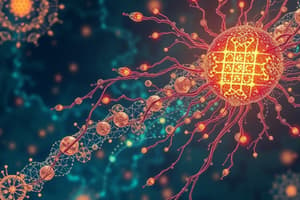Podcast
Questions and Answers
What role does the absolute refractory period play in action potential conduction?
What role does the absolute refractory period play in action potential conduction?
- It increases the threshold for generating an action potential.
- It prevents a second action potential from starting until the first one is completed. (correct)
- It allows multiple action potentials to occur simultaneously.
- It enables action potentials to travel backwards along the axon.
How does a depolarizing graded potential affect a neuron?
How does a depolarizing graded potential affect a neuron?
- It has no impact on the generation of action potentials.
- It decreases the membrane potential, moving it away from threshold.
- It increases the likelihood of firing an action potential. (correct)
- It makes the neuron less likely to fire by opening K channels.
Which factor influences the speed of action potential conduction?
Which factor influences the speed of action potential conduction?
- The concentration of neurotransmitters in the synapse.
- The diameter of the axon and whether it is myelinated. (correct)
- The length of the neuron.
- The presence of voltage-gated K channels.
What effect does hyperkalemia have on a neuron?
What effect does hyperkalemia have on a neuron?
What is the primary mechanism by which hyperpolarizing graded potentials act?
What is the primary mechanism by which hyperpolarizing graded potentials act?
Which of the following best describes the nature of action potentials traveling from the trigger zone to the axon terminal?
Which of the following best describes the nature of action potentials traveling from the trigger zone to the axon terminal?
What happens to the threshold needed to fire an action potential during hypokalemia?
What happens to the threshold needed to fire an action potential during hypokalemia?
Which condition aids in facilitating saltatory conduction?
Which condition aids in facilitating saltatory conduction?
What is the impact of chemicals that block ion channels on action potentials?
What is the impact of chemicals that block ion channels on action potentials?
In a normal range of blood potassium, what effect does a subthreshold stimulus have on an action potential?
In a normal range of blood potassium, what effect does a subthreshold stimulus have on an action potential?
Flashcards are hidden until you start studying
Study Notes
Resting Membrane Potential
- Major intracellular cation is potassium (K+), while sodium (Na+) dominates the extracellular fluid (ECF).
- Chloride ions (Cl-) are primarily found with Na+ in the ECF, while phosphate ions and negatively charged proteins are key anions in the intracellular fluid (ICF).
- Cells exhibit a net negative charge intracellularly and a net positive charge extracellularly, leading to electrical disequilibrium.
- Membrane potential (Vm) arises from concentration gradients and selective membrane permeability.
- Active transport of cations generates an electrical gradient, resulting in a resting membrane potential.
Ion Concentration Gradients
- Potassium concentration is 150 mM inside and 5 mM outside the cell, with an equilibrium potential (EK) of -90 mV.
- Sodium concentration is 150 mM outside and 15 mM inside, yielding an equilibrium potential (ENa) of +60 mV.
- The Nernst equation computes equilibrium potentials for ions at 37°C, using respective ion concentrations and charges.
Goldman Equation
- Membrane potential can be calculated using the Goldman equation, incorporating multiple ions' permeability.
- The equation considers permeability values: Pk for potassium and PNa for sodium, resulting in a membrane potential of approximately -70 mV.
Action Potential
- Action potentials are triggered by sufficient depolarization, generally requiring a threshold of -50 mV.
- Sodium (Na+) channels open during depolarization, causing rapid influx and further depolarization toward ENa.
- During an action potential, Na+ permeability dominates, while K+ and Cl- become minor contributors.
Rising and Falling Phases of Action Potential
- Initially, Na+ influx causes rapid depolarization.
- After reaching peak potential, Na+ channels inactivate, and delayed K+ channels open, leading to repolarization and hyperpolarization.
- Hyperpolarization occurs due to prolonged K+ efflux, with potential dipping below resting levels.
Refractory Periods
- The absolute refractory period prevents a second action potential for about 2 msec, due to inactivation of Na+ channels.
- Following this is the relative refractory period, during which some Na+ channels reset, allowing for potential action with a stronger stimulus.
Conduction of Action Potentials
- Action potentials propagate unidirectionally from the trigger zone to the axon terminal, avoiding overlap due to the refractory period.
- Depolarizing graded potentials (excitatory) increase likelihood of firing action potentials; hyperpolarizing graded potentials (inhibitory) decrease this likelihood.
- Larger axon diameter and myelination enhance conduction speed through mechanisms like saltatory conduction.
Effects of Extracellular Ion Concentrations
- Normal potassium levels (normokalemia) prevent subthreshold graded potentials from eliciting action potentials, while suprathreshold stimuli reliably do.
- Hyperkalemia brings the membrane closer to threshold, enabling weak stimuli to trigger action potentials.
- Hypokalemia moves the membrane further from threshold, requiring stronger stimuli to elicit action potentials.
Studying That Suits You
Use AI to generate personalized quizzes and flashcards to suit your learning preferences.




